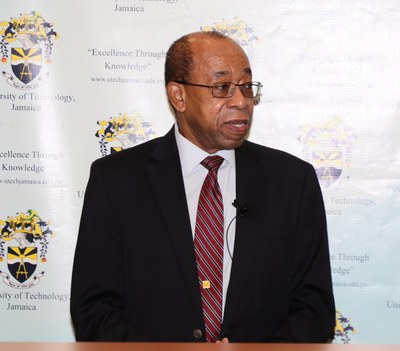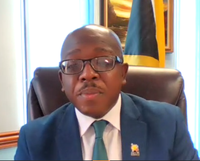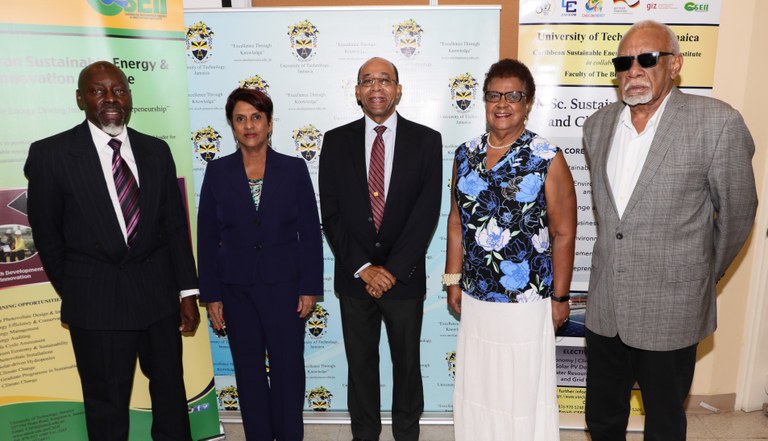Dr. Wesley Hughes, CD, Adjunct Professor, CSEII Calls for the Implementation of a New Green Industrial Policy
 Dr. Wesley Hughes, CD, Adjunct Professor, Economics, Climate Change and Renewable Energy, Caribbean Sustainable Energy and Innovation Institute (CSEII), UTech, Jamaica on Tuesday, November 23, 2021 presented a compelling and urgent argument for the introduction and establishment of a new green industry policy for Jamaica. Dr. Hughes was delivering his virtual Distinguished Public Lecture on the topic “Driving Jamaica’s Transformation through A New Green Industrial Policy” via Zoom.
Dr. Wesley Hughes, CD, Adjunct Professor, Economics, Climate Change and Renewable Energy, Caribbean Sustainable Energy and Innovation Institute (CSEII), UTech, Jamaica on Tuesday, November 23, 2021 presented a compelling and urgent argument for the introduction and establishment of a new green industry policy for Jamaica. Dr. Hughes was delivering his virtual Distinguished Public Lecture on the topic “Driving Jamaica’s Transformation through A New Green Industrial Policy” via Zoom.
Dr. Hughes, while emphasizing the need for the continuous growth, expansion, diversification and development of the Jamaican economy, called for the introduction of an environmental and ecological friendly industrial policy as the basis for growth and development that respects and protects the environment, noting “we cannot assume that we can continue to grow our economy the old way, where we destroy the environment, and take very little care of the gift of nature; our ecology. It is not sustainable,” he stressed. Industry, Dr. Hughes explained, is not limited to manufacturing, but encompasses economic activities including agriculture, agro processing, construction and the entire economic sphere which is resting on the ecology of the country.
In establishing the way forward, Dr. Hughes looked back at the industrial policies of the 1950s to mid-1970s, which he described as the “Golden Era of Industry” where the Jamaican economy rapidly grew by an average of 8% per annum, fueled by expansion into bauxite. “We embarked on the development strategy which was based on the importation of capital to drive the growth and expansion of industry,” which he noted aligned with the growth and development strategies being supported at the time. These strategies had the government as their centre, encouraging industry through offering incentives, such as subsidies, trade restrictions and lower interest rates.
Dr. Hughes lamented, however, that “this growth was at a huge cost in terms of the environment”, where harmful practices including dumping effluents into the harbor, destruction of the beaches, forests and underground water supply systems were carried out, not just in Jamaica but globally, with very little regard to the consequences.
The challenge following this period, Dr. Hughes highlighted, was the need to resume growth, in conditions created by the pandemic, in the era of climate change, and to preserve the environment and protect the ecosystem. “The only way we can do this, quite frankly, is to recognize where we are and to change course,” he opined. Making reference to the haphazard nature of leadership response to industrial and infrastructural crises without consideration to the environment, Dr. Hughes pointed out that current development is not “built to last”, since it follows no set planning, and is only built to “meet immediate demand”.
Dr. Hughes noted that Jamaica’s Vision 2030 development plan came out of a desire for a green economy; which he defined as “an economy that sustains itself; fostering economic growth and development while ensuring that the natural assets continue to provide the resources and the environment services on which our well-being relies.” Citing various studies, he enumerated the benefits of the implementation of a green economy, including better health, better educational outcomes, preservation of resources and immediate reduction in use of resources and avoidance of increasing future cost of implementation of green economic policies.
Dr. Hughes noted that “institutional capacity to undertake such a wide-ranging green transformation of the entire economy and society is not yet in place,” and further argued that “green strategies, by their very essence, are multi-sectoral, and require inter-agency, and public-private coordination.” Dr. Hughes noted that deep structural issues cannot be resolved by “tinkering with the pricing mechanism of the market”, but would be achieved through the combination of a strong and capable state, socially responsible businesses and an informed and involved populace. This coalition will ensure that the capacity and effectiveness of the state is rebuilt to enforce regulations and prevent capture by special interests, the green investment policy and the investment policy is quickly incorporated into the medium-term economic framework plan, and the research and design strategy is reviewed and reframed to ensure that investment is rechanneled into innovations and technologies to drive renewable and sustainable growth.
Dr. Hughes, in summarizing, told the online gathering, that the green industrial policy can only succeed if it is driving growth, competitiveness and innovation, increasing productivity through transforming industrial activities, and is supported by a governmental framework that coordinates and regulates its policies.
 The Honourable Pearnel Charles, Jr., Minister of Housing, Urban Renewal, Environment and Climate Change, who brought greetings, noted the importance of establishing infrastructure and policy to drive sustainable economic growth. Minister Charles informed that the Government is currently working to create an environment which stimulates and generates green investments, and also involves and encourages the development of effective public policies including green fiscal policies to move the country towards a green economy.
The Honourable Pearnel Charles, Jr., Minister of Housing, Urban Renewal, Environment and Climate Change, who brought greetings, noted the importance of establishing infrastructure and policy to drive sustainable economic growth. Minister Charles informed that the Government is currently working to create an environment which stimulates and generates green investments, and also involves and encourages the development of effective public policies including green fiscal policies to move the country towards a green economy.
He also praised the University of Technology, Jamaica for “continuing to be a leader in action in developing the minds and the capacity for the Caribbean region”.
Professor Colin Gyles, Acting President, in his welcome remarks, noted that the distinguished public lecture is timely, “coming as it does on the heels of the recently concluded United Nations Climate Change Conference (COP26), which brought into sharper focus the issues and impact of climate change, and the growing urgency for countries to invest and operate in sustainable ways of living that respect the environment.”
While praising Dr. Hughes for his “enduring advocacy for a ‘green growth’ era for Jamaica that is built around new investments in green technological innovations based on renewable energy”, Professor Gyles expressed the University’s continued commitment to contributing to policy and programme solutions that seek to address the urgent climate crisis and to secure Jamaica’s energy future in keeping with Vision 2030 targets.

Panelists (from l-r) Mr. Kingsley Thomas, OJ, Development Banker, Mrs. Eleanor Jones, OD, Chair, PSOJ Committee on Energy, Environment and Climate Change and Dr. Ruth Potopsingh, Associate Vice President, CSEII at the Distinguished Public Lecture on Tuesday, November 23, 2021.
The Distinguished Public Lecture also included a panel discussion featuring Mr. Kingsley Thomas, OJ, Development Banker, Mrs. Eleanor Jones, OD, Chair, PSOJ Committee on Energy, Environment and Climate Change and Dr. Ruth Potopsingh, Associate Vice President, Caribbean Sustainable Energy and Innovation Institute (CSEII), who echoed the urgency of collaboration between public and private entities to move towards more sustainable research, development and economic strategies, as well as the role of academia, government and the private sector in the implementation of a new green industrial policy. Mr. Hector Wheeler, AVP, Advancement moderated the event.

Dr. Wesley Hughes (centre), Adjunct Professor, Economics, Climate Change and Renewable Energy, CSEII shares lens time with from (l-r) Mr. Hector Wheeler, AVP, Advancement, Dr. Ruth Potopsingh, AVP, CSEII, Mrs. Eleanor Jones, OD, Chair, PSOJ Committee on Energy, Environment and Climate Change and Mr. Kingsley Thomas, OJ, Development Banker, following his Distinguished Public Lecture on Tuesday, November 23, 2021 at the UTech, Jamaica Papine Campus.
End.
Contact:
Michelle Beckford (Mrs.)
Corporate Communications Manager
University of Technology, Jamaica
Telephone: 876 970-5299
Email: mbeckford@utech.edu.jm

